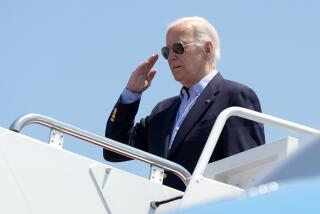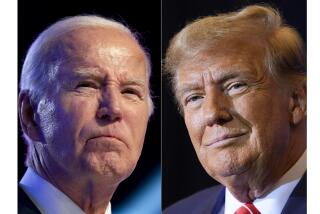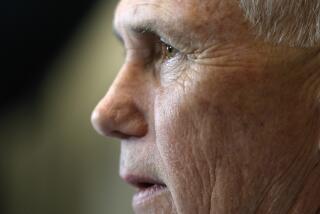NEWS ANALYSIS : Clinton Tries to Leap New Ruts in Road : Campaign: Today’s primaries should put him nearer finish line. But latest misconduct charges reimpose hurdles.
- Share via
WAYNE, Mich. — Is that the finish line in the Democratic presidential race looming before Arkansas Gov. Bill Clinton, or just another rut in the road?
From the start, Clinton’s campaign has pointed toward today’s Illinois primary as the place where the Arkansas governor would demonstrate his national strength and effectively wrap up the nomination.
Now, weekend polls show Clinton poised to win not only in Illinois, which will select 164 delegates, but also today’s primary in Michigan, where 131 delegates are at stake. In the process, Clinton is positioned to substantially pad his delegate lead and deal a devastating blow to his chief rival, former Massachusetts Sen. Paul E. Tsongas, who just last week described the Midwestern showdowns as “neutral territory.”
But, even as his aides talked of shifting their attention toward President Bush, Clinton on Monday found himself thrust back into a position as familiar as it is uncomfortable: addressing charges from his rivals that new allegations of personal misconduct have left him too politically damaged to nominate.
This latest controversy--centered on business done with the state of Arkansas by the law firm in which his wife, Hillary Clinton, is a partner--guarantees that even decisive victories tonight won’t dispel widespread uneasiness in the party about Clinton’s electability, many analysts say. That anxiety gives both Tsongas and former California Gov. Edmund G. (Jerry) Brown Jr. a branch on which to hang their hopes of tripping Clinton further down the line.
“I think you are going to see sand between the cogs here for quite a while as Tsongas and Brown continue to exploit the doubts that are out there,” said Democratic pollster Alan Secrest. Reflecting that sentiment, both Tsongas and Brown on Monday vowed to stay in the race until the Democratic convention in July.
But both Brown and Tsongas face formidable obstacles in turning concern about Clinton into support for their own candidacies. Tsongas’ campaign has demonstrably stalled in the Midwest, paralyzed by his inability to connect with blue-collar voters. Brown has done better with workers by stressing his opposition to a fast-track negotiation of a free-trade agreement with Mexico, but he still faces a cultural chasm with many lower income voters--and funding constraints that limit his ability to widely disseminate his message.
That leaves many party leaders in a bind. On the one hand--though impressed by Clinton’s tenacity in battling through the repeated allegations of misconduct--many continue to fear that the cumulative weight of the charges will drag him down in November.
On the other hand, most of these same Democrats are rapidly losing hope that either Tsongas or Brown has the breadth of support to throw the convention into deadlock, much less defeat Clinton outright.
Some of the major industrial unions, for example, fear that Clinton has been fatally compromised, but they have few plausible options. Because of his opposition to anti-strikebreaker legislation, Tsongas is perhaps even more anathema to labor than Clinton.
At the same time, some key national union officials appear uncertain that Brown can generate equal interest in states less acutely sensitive than Michigan to the flight of jobs to Mexico.
Clinton’s aides maintain that his string of primary victories shows that voters have put behind them the allegations of marital infidelity, controversy over his Vietnam-era draft status and allegations of financial impropriety lodged against him. But other party strategists say that no matter how Clinton performs in these contests he cannot eliminate the two keenest concerns: that independents and less-partisan Democrats won’t accept him in a general election, and that more allegations may surface to weaken him further.
Many Democrats believe that may be exactly what Tsongas and Brown are banking on. “The other candidates are betting that another shoe will drop, and it will happen before the convention and they will be there (as a fallback choice),” said Secrest.
Still, that’s no sure thing, even if Clinton is hit again. Few analysts believed Clinton could survive even the blows he has absorbed so far. As each new storm arises, he confidently portrays his ability to weather the questions as proof of his strength of character.
“I’ve tried to demonstrate to you in this campaign that I’m tough enough to fight George Bush--to take a punch and to land one,” Clinton told an enthusiastic high school audience here Monday.
After the past two months, no one doubts Clinton’s toughness. But even as Clinton stands up to each new jab, he has still not convinced many Democrats that he can do something just as important: keep himself out of harm’s way.
More to Read
Get the L.A. Times Politics newsletter
Deeply reported insights into legislation, politics and policy from Sacramento, Washington and beyond. In your inbox twice per week.
You may occasionally receive promotional content from the Los Angeles Times.










